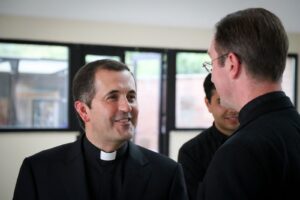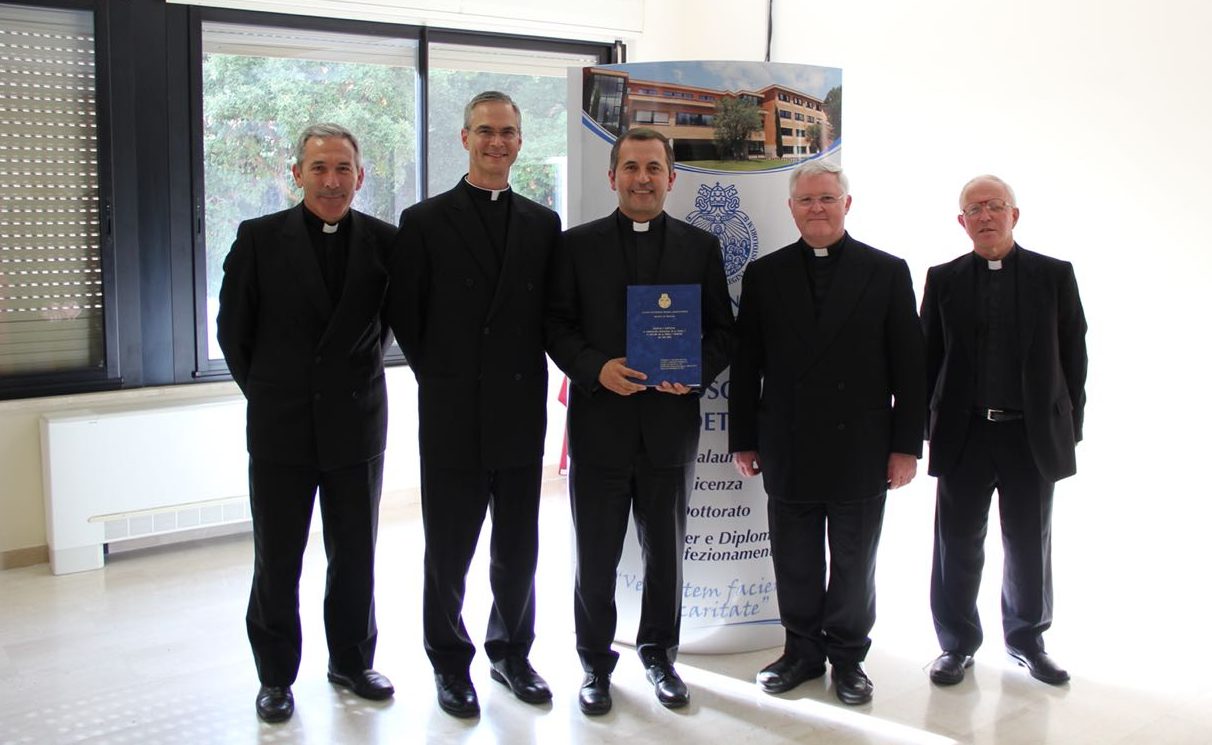Father Benjamin Clariond, LC, was the director of the Office of International Communication of Regnum Christi – and of the Legion of Christ – between 2012 and 2017. He has just defended his thesis “Communicate and Participate: Institutional Communication in the Church and its Relationship with the Guardianship and Promotion of the Common Good,” partly the result of his experience leading the Office. Grade: Summa cum laude.
 We spoke with him about why a thesis in theology, about the practical value that his thesis can contribute, about the negative dynamism of clericalism, or about how the Pope fosters a culture of communication in his fight against the culture of abuse. Also about the role that the common good played in managing the crisis of Father Maciel, about how it helps to discern who has the right to what information, and about governance and responsibility in informing. Among other things. “Christianity does not fear questions, no matter how difficult or inconvenient they are, and the Church cannot have a different model,” he tells us.
We spoke with him about why a thesis in theology, about the practical value that his thesis can contribute, about the negative dynamism of clericalism, or about how the Pope fosters a culture of communication in his fight against the culture of abuse. Also about the role that the common good played in managing the crisis of Father Maciel, about how it helps to discern who has the right to what information, and about governance and responsibility in informing. Among other things. “Christianity does not fear questions, no matter how difficult or inconvenient they are, and the Church cannot have a different model,” he tells us.
How did the hypothesis of the thesis arise? Why relate institutional communication to the common good and its guardianship? And why connect everything with participation?
It arose more from experience than from an idea, because when I assumed the international leadership of the Communication Office of Regnum Christi, I needed reference frameworks to always act in accordance with the common good. Reading the books available on the subject, I became convinced that institutional communication could not be related to technical aspects alone but had to be linked to respect for truth, justice, charity… and therefore, it necessarily has a moral dimension. On the other hand, I observed that at certain moments, the institutional crisis of the Legion, the lack of official institutional information in some cases, generated concern and disorientation because it deprived people of useful information to face the problem and make responsible personal decisions. Information was fundamental to participate in building the common good and also in shaping public opinion, which are two aspects of the obligation we all have to participate from our place.
Information, therefore, is one of the elements that enable participation. In fact, the pontifical Magisterium, the letter *Aetatis Novae*, and some messages from the popes speak of countries poor and rich in information, and the poor have less opportunity to participate in the international community. Being rich or poor in information impacts our capacity to contribute to the common good.
Does this thesis transcend to the ecclesial institutions themselves? Is there anything that might be of interest to the world of institutional communication in general?
 I believe so. The Church’s social doctrine provides principles for reflection, criteria for judging, and guidelines for action. These can be applied to any social reality. Every enterprise, every geopolitical group, every organization, every institution has a role to play in building the common good. Therefore, making oneself known with words and actions as a trustworthy actor to participate in social life is positive and even necessary.
I believe so. The Church’s social doctrine provides principles for reflection, criteria for judging, and guidelines for action. These can be applied to any social reality. Every enterprise, every geopolitical group, every organization, every institution has a role to play in building the common good. Therefore, making oneself known with words and actions as a trustworthy actor to participate in social life is positive and even necessary.
The thesis focuses on the Church, which has particular demands. The key is that an institution can present its identity coherently at all times: that the way of communicating reflects who it is, so that it gains consistency and reliability to participate in social life.
What would be those special demands for the ecclesial institution?
Communication must reflect the institutional identity. Therefore, if the Church defends the centrality of the person, it cannot sacrifice it for the sake of a communicative technique. If the Church seeks to illuminate with its Magisterium the truth, the morality of things… communication cannot be based on lies. It may make mistakes and sometimes provide inaccurate information due to lack of precise knowledge, but it cannot have an intention to deceive. Therefore, if the Church aims to be the continuation of Christ, present in history, it must live up to this demand. I believe we have learned a lot, but there is still a long way to go for improvement.
Why is this a thesis in theology?
The thesis is on the social doctrine of the Church, and seeks to bridge theology and the criteria of the Gospel with human activity, which is increasingly important in social life and has an impact on the pursuit and promotion of the common good. Saint John Paul II affirms in *Sollicitudo Rei Socialis*, and later in *Centesimus Annus*, that the social doctrine belongs to moral theology. That is why the thesis is framed within theology. It aims to contribute, even if incipiently, to the invitation made by Benedict XVI that, just as there is bioethics, there should be an *infoethics*.
Such a work is the fruit of experience, but there is also learning during the study. What is the most relevant thing you have learned during your research?
Many things, but I would highlight three: that there is no particular good that is truly good if it is not related and set in the horizon of the common good. For example, safeguarding a person’s good reputation — which is good in itself — is not truly good if it is not in harmony with the common good.
The crisis of sexual abuse of minors by priests is a sadly emblematic case of this situation. Sometimes, to safeguard the good name of a priest, or of the priesthood in general, criminal acts were silenced, or a priest who committed crimes of this nature was transferred to another parish, perhaps with the backing of an expert, but without informing the community that received him, so they could take appropriate precautions. This is a profound injustice, because in order to safeguard the good name of the person who committed a crime, the right of others — perhaps not all, but some — to know this information is sacrificed. Moreover, they should have reported it to authorities. The consequences for the credibility and reputation of the Church have been tragic due to improper action.
The second major lesson is the importance of learning to communicate according to the digital paradigm in which we operate, where what matters is not just the dissemination of information but participation and sharing, which is the dynamic observed on social networks. Also, learning the language of this digital paradigm, where there is not a single discourse but a multiple conversation, not an auditorium but a marketplace where everyone can have an opinion and it must be taken into account.
And third, that good or poor communication impacts the common good of the institution, the good of individuals, and society at large. A poorly handled problem can damage the credibility of the Church worldwide. Conversely, a positive action can favorably influence how the Church is perceived globally. Here too, it must be said that image always precedes actions: one cannot sell smoke; one must always start from the reality of things.
There has been a trajectory in how the Church has considered the media, from acceptance as a necessary evil, to its consideration as a means to achieve certain ends. Where is the magisterium now regarding this?
The magisterium now sees the media not just as simple tools for spreading the Christian message but as a meeting place, a platform where culture is shaped and relationships with others are built, where questions and answers are exchanged… It is like a digital continent that also needs evangelization through presence and active participation. They view it positively overall, but also recognize that it can be misused, so education on proper use and digital citizenship is required.
What do we mean when we talk about “culture of communication”?
Communication is intrinsic to Christianity. It is how the Gospel was announced from the beginning, when one person transmitted the Gospel to another. It is an exchange where the person not only transmits ideas but also gives themselves. Institutional communication is organized by the institution with the aim of establishing relationships with its various audiences, to achieve a favorable reputation, which must obviously align with the truth, and to fulfill its mission in society.
Creating a culture of communication is a desire to share, to communicate. A culture where secrets are the exception rather than the norm, and where all people have access to the information they deserve. That does not mean there are no secrets, because a secret can be very necessary in negotiations, for example, or in activities like the Conclave. But secrets should never be used to hide wrongdoing: that is not a secret, that is an aberration of the concept. A secret is the necessary confidentiality to develop conversations in a protected environment, for example, but never an excuse to conceal evil.
What do you think Pope Francis is contributing to this culture of communication in the current context, especially as he challenges and confronts the culture of abuse in the Church?
I believe Pope Francis has contributed greatly, mainly through his example. Pope Benedict XVI had already made significant contributions and interventions because action is the primary form of communication: one must act rightly and then, if necessary, share that with certain audiences. It’s not just about making things known: it’s about always acting correctly. I believe Pope Francis sets an example of reaching out to affected persons, showing compassion. And not allowing structures of power that could compromise the truth to be hidden, structures accessible to people, or structures that could become a kind of omertà, as happens with clericalism.
For example, clericalism is not only a phenomenon among clergy: it is also common among laity who consider that a priest, simply by being a priest, is either impeccable, or plays in a superior league, or always has the right answer and cannot be questioned. That is not how the Church is seen by Vatican II, and it has caused much harm because it fosters a kind of omertà, with consequences such as a priest not reporting another priest’s misconduct. Or a layperson would not report a priest’s misconduct just because he is a priest. Clericalism discourages laity participation in Church life, especially in decisions that concern them.
These manifestations of clericalism, which Pope Francis constantly opposes, greatly harm communication because, at heart, they foster a culture of secrecy and complicity to hide things that should not be hidden. However, this does not mean that defamation is acceptable. One can never reveal negative information about a person, even if true, with the intent to damage their reputation. Conversely, it is permissible to disclose information to those who need it, such as when the Code of Canon Law requires reporting impediments to receiving Holy Orders or marriage.
I believe the way out of clericalism is to deeply value the dignity and richness of the shared vocation to holiness that springs from baptism. The second step is to value the specific paths, the specific vocations, which are extraordinary: laity, marriage, single life, consecrated life, priestly life… all are equally valid paths to respond to the call to holiness. And finally, to value one’s own vocation personally, to live it with dignity.
Certainly, your thesis contains an excursus on the negative influence of clericalism on the Church’s institutional communication. What can Regnum Christi learn from this reflection, in light of its own history and future?
Often, it is laity more than clergy who hold an excessive respect that leads to not questioning the clergy. I believe what is being done — the ability to express one’s views, dialogue, feel responsible, participate, respect, and make decisions according to one’s role — is very important.
It is crucial to know how to speak the truth with charity, and to accept that one does not always have the right just because one is consecrated or a priest or a legionary or layperson. No one always has the right, and it always enriches us to hear other points of view in the search for truth together.
In managing the communication during the Maciel case crisis, what role did the consideration of the common good play in decision-making? What role can this thesis play in a comprehensive analysis of the communication management of that crisis? Have you seen progress in the institutional communication of Regnum Christi?
I believe that the decision to communicate transparently and provide official information reduced much tension and distrust towards authority because when authority does not provide timely, relevant, sufficient, and truthful information, distrust in its ability to guide people and the community toward the primary responsibility of the common good is naturally generated. Starting to give information and treat members of Regnum Christi, the public opinion, and the media as adults, providing them with information they have a right to, has helped recover the institution’s credibility; there is still a long way to go, but important steps have been taken in that direction.
At the same time, it is necessary to provide information. For example: in the Legion, you used to find out about someone leaving the Congregation through gossip, and now you find out because there is an official bulletin stating it. Just as we celebrate their profession, we deeply regret and respect the decision that leads them to leave, but it is a public fact that we have the right to know. The fact that such information is shared gives confidence. It fosters trust that resolutions from certain meetings are shared and that information is provided so we can feel like active, living members of the family, treated as adults capable of discerning, knowing the truth, and making mature decisions, able to express opinions, and have a multidirectional flow of information from different experiences. Always, this is an enrichment that helps communion. It fosters trust that there are no taboo topics.
In the management of that crisis, a disordered relationship between truth and charity was also experienced in Regnum Christi. Ladaria recently said that they are not opposing realities but necessary ones.
Sometimes, the relationship between truth and charity has been poorly managed, and information has not been provided in a timely manner due to a concept of charity that leads to denying real faults. It is not about announcing them loudly, which is unnecessary and can be a sin of defamation, especially if spread indiscriminately on social media, but it is necessary to tell those who have the right to know, especially if they need to act accordingly.
And what is the criterion for knowing who has the right to what information?
Two criteria come into play: prudence, which governs the exercise of all virtues; and the binomial of charity in truth and truth in charity. Charity guides us to manage the truth correctly, using Von Balthasar’s brilliant expression. This does not mean manipulating it, but discerning from charity when it is appropriate to speak and when to remain silent, considering the context, the audience, the reality of the facts, etc. Perhaps the promotion and guardianship of the common good help us most to determine what should be communicated. Let me give an example: if a family has a serious financial problem and has adult and young children, it is very wise not to fall into the trap of saying nothing so that the children do not worry. It is better to tell them, giving them the opportunity to share responsibility and help resolve the problem. If the parents remain silent and the situation worsens, when bankruptcy arrives, the children may have lost trust in the parents who did not provide relevant information in a timely manner, especially because it affected them. Information should be given to those who have the right to access it, and channels for its dissemination should be chosen accordingly. Generally, when acting correctly, one does not need to give information beyond those directly involved. Information enables participation: if I am a young university student and my father tells me he is doing poorly in the family business, I will change my spending habits to contribute to the common good. If I have no idea, I cannot participate.
Regarding the relationship with the press, you state that institutional communication aligned with truth, responsibility, and sensitivity — as expected of the Church — “requires a special commitment from those representing the Church or its institutions to honesty and integrity in relations with journalists, and a willingness to offer credible and truthful responses even to questions that may be uncomfortable or perplexing.” Why respond to those questions?
I must answer those questions because Christianity does not fear questions. Christianity combines faith and reason, which go together.
And because providing deep and relevant information that reveals one’s identity is already a contribution to the common good, and, as I said, Christianity does not fear questions. The main protagonists of Salvation History respond with questions, and the Lord always responds. And the Church cannot have a different model. It is better to give one’s own view of the facts, even if it can later be complemented by other parallel and opposing views, rather than have others give their version of history and then have to correct inaccuracies.
Being transparent also means being able to explain why certain information cannot be given at a particular moment. When one cannot provide information, one should simply say: “At this moment, it is reserved; I cannot give it for these reasons — because we are in a judicial process, or because a conclusion has not yet been reached… whatever the case may be.” Transparency also involves telling people that certain information cannot be given at that moment and committing to provide updated information when appropriate. But the reasons why it cannot be given must be explicitly explained.
And what is the criterion behind the fact that highly educated people in the Church consider that the relationship with the media is a “necessary evil”?
Some well-formed people in the Church see communication as a necessary evil partly because of negative experiences with criticism and negative comments that have appeared in the media, which may not be accurate. Also, sometimes because they are held accountable, certainly.
It can be seen as a necessary evil because there is no other choice. But Pius XII said that it is everyone’s duty to participate in public opinion, even within the Church. It is not a necessary evil but an opportunity to contribute to the common good.
However, there are those who live in a paradigm — which no longer exists — where there is only one spokesperson, one discussion, a controlled message, and set times to do things. They have not understood or experienced a model where everyone participates, where everyone has an opinion, where there is not an informational cycle but a constant flow of information. It is normal for some who have not understood or experienced firsthand the change brought about by social networks to see the media environment as bothersome. They would like everything said about the Church in the media to be positive, but that is not only impossible; it would also










